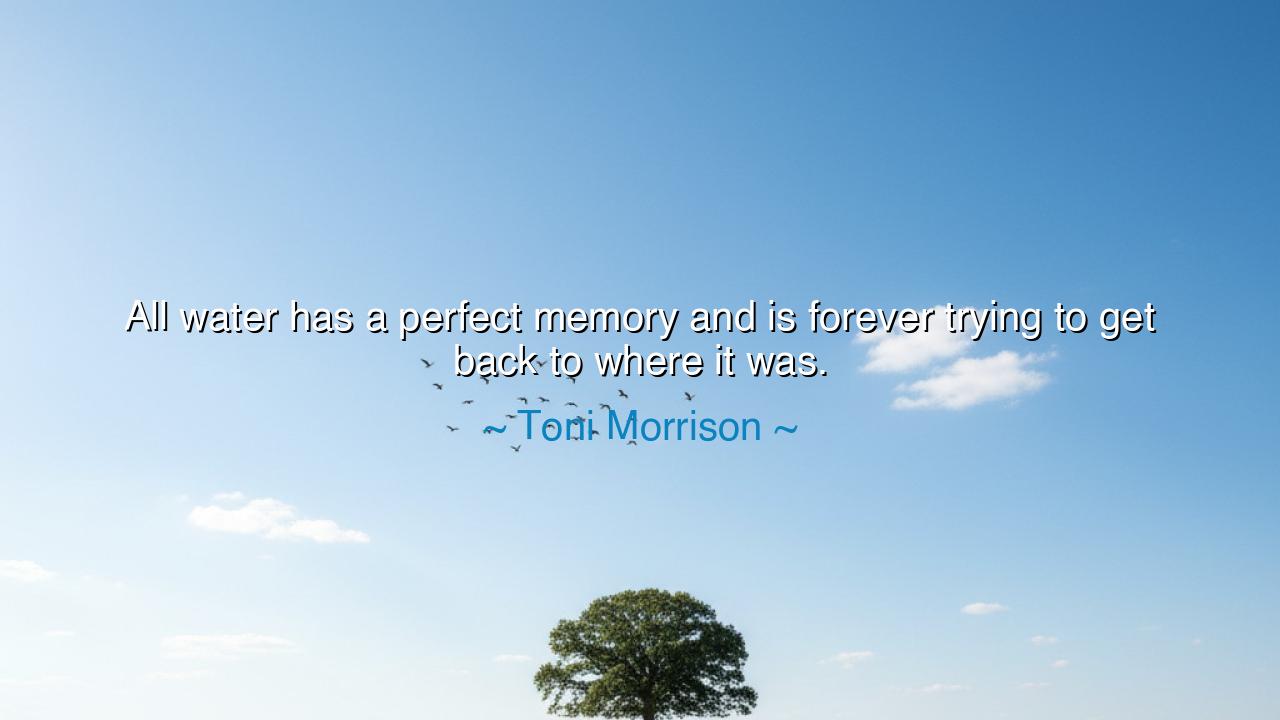
All water has a perfect memory and is forever trying to get back






Hear the profound words of Toni Morrison, the poet of memory and spirit, who wrote: “All water has a perfect memory and is forever trying to get back to where it was.” In this saying she gives voice not only to the rivers and seas, but also to the currents of the human soul. For water, like memory, does not forget its course. It flows ever downward, searching for its origin, returning always to the sea. So too do our lives carry the imprint of what has come before—our griefs, our joys, our wounds, our loves. Even when buried or diverted, they return, reminding us that nothing in existence is ever truly lost.
The origin of this quote lies in Morrison’s meditations on history and remembrance, particularly the memory of suffering carried by generations. To her, water symbolized both the persistence of the past and the longing for home. Just as rivers bend, dry, or are dammed yet still seek the ocean, so too do people, especially the oppressed, carry within them an unyielding pull back toward their roots, their stories, their beginnings. The memory of trauma and triumph alike, she suggests, remains with us, shaping the path of our lives like the riverbed shapes the stream.
Consider the journey of the Mississippi River, mighty and restless. For centuries men have tried to control it with levees and dams, bending its course for commerce and safety. Yet time and again the river breaks through, flooding lands, reclaiming its path, reminding all who live near it that water remembers. It seeks always the lowlands, the sea, the destiny set for it by creation. So too with the lives of men: no wall of silence or denial can forever contain what the soul remembers.
History gives us another lesson in the story of the African diaspora. Millions were torn from their homeland, scattered across oceans, forced into bondage. Yet their songs, their rhythms, their prayers carried the memory of their origin, flowing across centuries. Out of that memory rose new cultures, new voices, new freedoms. Like water, their spirit was bent but never broken, forever seeking to return to its source, to its truth. Morrison’s words echo this eternal struggle: memory may be suppressed, but it cannot be erased.
The meaning, then, is not merely about rivers or seas, but about the human condition. We, like water, are shaped by where we have been, and we carry within us a longing to return—whether to a place, a people, or a truth. Our past, both beautiful and painful, flows within us like underground streams, surfacing in dreams, in art, in stories passed down. To deny this is to live in illusion; to honor it is to find healing and wholeness.
The lesson for you, listener, is this: do not fear your memory, even when it is heavy. Like water, it seeks to flow, to return, to find rest. To dam it up is to invite the flood; to honor it is to guide it wisely, allowing it to nourish instead of destroy. Remember your own story. Remember the story of your people. In remembrance lies both wisdom and freedom.
Practical actions follow. Write down your memories. Speak them to those who come after you. If you have pain, do not bury it—seek to transform it into wisdom, as rivers transform stone into smooth pebbles. If you have joy, let it flow into others, as streams feed fields with life. And above all, respect the water of the earth itself, for in its cycles you see reflected the eternal truth of memory and return.
So let Morrison’s words be etched upon your heart: “All water has a perfect memory and is forever trying to get back to where it was.” Let them remind you that the past is not gone, but flows within you. Guide it, honor it, and learn from it. For just as the rivers find their way back to the sea, so too will your soul find its way home, if you let memory be your compass.






AAdministratorAdministrator
Welcome, honored guests. Please leave a comment, we will respond soon